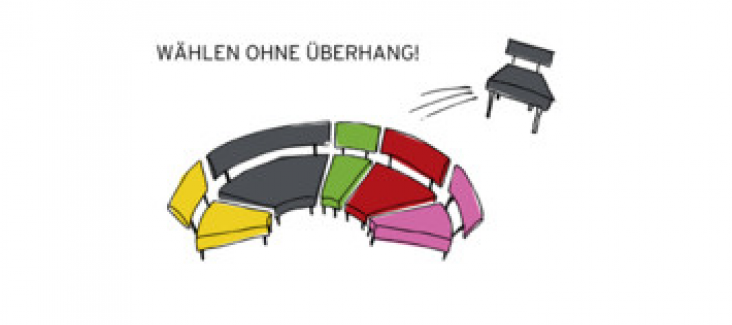The issues at stake are the so-called ‘overhang seats’ (Überhangsmandate) and the negative weight of votes. The German voters has two votes:
- The first one, the constituency vote, appoints the direct candidate in the electoral district.
- The second vote, called the party vote, decides a party’s proportional representation.
A party may hold a strong stance and can, thus, win more direct mandates than the party can allocate according to its second vote. These mandates remain as ‘overhanging seats’, yet adjusting these seats deforms the voting outcome.
The case of Dresden, Saxony in the 2005 parliament elections demonstrates the consequences. In a electoral district a by-election became necessary as one candidate deceased. The paradox was that the CDU would have lost a mandate in the German parliament, called the Bundestag if it had received too many second votes. On September, 22nd 2005, the newspaper ‘Die Zeit’ explained the reasons as follows: “The issue is, that overhang seats are calculated by state alone, but the proportions of the second vote are adjusted between the states. In Saxony (without the electoral district), the CDU has won 13 mandates with the first vote, although according to proportional representation, it may only allocate 10 mandates. Hence, the CDU has three overhang seats. However, if the CDU gains additional second votes in the by-election, the proportional representation has to be re-calculated and the CDU could allocate 11 mandates. Yet, as its national election result would not change much, the CDU would loose the mandate in a different region” (Source, translated by DI). Consequently, the CDU called its voters to neglect the second vote. This negative weight of vote contradicts the nature of democracy.
On July, 3rd 2008, the Constitutional Court dealt with this paradox, declaring the electoral law unconstitutional. The ruling granted a three-year period to pass a reform, however this period has so far been fruitless. The parties have not yet introduced convincing drafts, the Bundestag discussion remains idle, but the deadline is coming closer. The governing parties CDU/CSU and FDP have not presented their proposal, limiting the remaining time for public debate.
Therefore, Mehr Demokratie e.V in cooperation with wahlrecht.de calls the delegates of the German Bundestag to take immediate action. You can find the appeal at the homepage of Mehr Demokratie e.V.
Text by Vanessa Eggert
More Information:
German Electoral Law
Overhanging Seats
German Parliament: Bundestag
Photo courtesy of Mehr Demokratie e.V.

